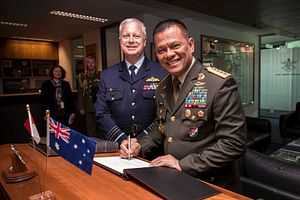This week, Australia’s army chief Angus Campbell will meet Indonesia’s military leaders in Jakarta. Apart from reaffirming the importance of a key bilateral security relationship, the trip is also an opportunity to smooth over ties following a spat last month and pave the way for even greater collaboration between the two sides.
As I have noted previously, Indonesia and Australia, two neighboring, significant, and highly-capable actors in the Indo-Pacific, have been strengthening their defense relations over the past few years, with notable steps including the inking of the Lombok Treaty in 2006 and the launching of the two-plus-two dialogue in 2012 (See: “Why Do Australia-Indonesia Military Relations Matter?”). This has occurred despite periodical tensions and crises that have rocked ties.
Though the emergence of Australian Prime Minister Malcolm Turnbull in September 2015 had given a new boost to bilateral ties, in January, the rocky relationship hit another snag when Indonesia’s military spokesman said bilateral cooperation had been suspended temporarily due to concerns about some teaching materials at an Army language training facility in Australia (See: “Indonesia-Australia Military Relations Hit Another Snag”). While the extent of the fallout ended up being much more limited than initially suggested and both sides quickly signaled their commitment to preserve ties, it nonetheless once again revealed the fragile nature of a deepening defense relationship between the two countries.
Campbell’s trip would be one of a series of steps that would reaffirm the importance of the military relationship. To be sure, functional cooperation has continued on in spite of the hype about the latest snag, as evidenced by the convening of the third meeting of the Australia-Indonesia Ministerial Council on Law and Security last week which touched on topics including terrorism, cybersecurity, and intelligence collaboration (See: “Old Shadows in New Australia-Indonesia Military Spat”). But Campbell’s meetings will give him a chance to meet top defense officials including Indonesian military chief Gatot Nurmantyo and army chief of staff Mulyono.
More specifically, Campbell’s trip is also an opportunity to smooth over ties following the latest snag. Indonesian officials had subsequently clarified last month that only cooperation related to the military’s Australia-based language training program had been suspended, rather than the overall defense relationship as was speculated previously. Nonetheless, the concerns about teaching materials are far from minor; the allegedly offensive content ties into broader issues like West Papua and East Timor which are sensitive for the Indonesian military and have also roiled bilateral ties previously. Campbell’s visit is an opportunity for both sides to manage that issue, including discussing the findings of an ongoing investigation that Australia had already opened.
Clearing the air now would be additionally useful because it would patch things up ahead of Indonesian President Joko “Jokowi” Widodo’s trip to Australia in a few weeks time. That much-anticipated trip was supposed to take place last November but was postponed as Jokowi had to contend with the fallout from blasphemy allegations against the Christian and ethnically Chinese governor of Jakarta, popularly known as Ahok.

































